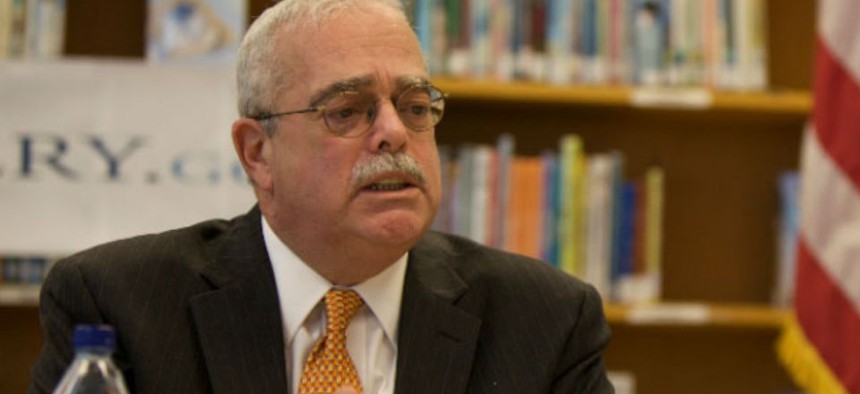
Rep. Gerry Connolly, D-Va., says higher pay is needed to recruit and retain skilled federal workers. Office Gerry Connolly file photo
Bills Would Give Feds a 3.8 Percent Pay Raise
Democrats in both House and Senate introduced bills they say would help recruit and retain top talent.
Lawmakers in the both the House and Senate introduced bills on Tuesday to raise federal employees’ pay 3.8 percent across the board in 2016.
The Federal Adjustment of Income Rates (FAIR) Act was introduced in the House by Rep. Gerry Connolly, D-Va., with several Democratic cosponsors. Sens. Brian Schatz, D-Hawaii, and Ben Cardin, D-Md., introduced identical legislation in the Senate.
The proposal marks a slight uptick from the 3.3 percent raise the group of fed-friendly lawmakers introduced last year. Those measures stalled out in committee in both chambers.
Connolly said the bill was necessary to stop the “alarming rate of attrition” of federal employees. Citing a Partnership for Public Service analysis, Connolly noted more than one-quarter of the federal workforce has left government since 2009. The 3.8 percent across-the-board raise would also apply to hourly employees.
Federal employees received a 1 percent pay raise in each of the last two years after seeing their pay frozen for the previous three. Those increases did not keep pace with either inflation or the private sector, Connolly noted. Private sector wages have outpaced federal pay by 6.3 percent over the last five years, according to the Employment Cost Index. Even by the federal government’s own standards, the 1 percent raises were historically low.
“Our federal workers deserved to be fairly compensated for the important work they do on behalf of Americans across the country,” said House Minority Whip Steny Hoyer, a cosponsor of the bill. “So many of the public functions we often take for granted are the purview of the hard working men and women who constitute our federal workforce, and they deserve fair pay and benefits. Advancing the FAIR Act will help the government recruit and retain the top-quality workforce the American people need and deserve.”
President Obama has not yet proposed his federal employee pay raise for 2016, which is typically released in conjunction with his budget blueprint. Last year, lawmakers waited until after Obama issued his 1 percent raise proposal to introduce their bills.
Federal employee groups have criticized the 1 percent pay bump for the last two years, calling it insufficient and even “pitiful.” Richard Thissen, president of the National Active and Retired Federal Employees Association, said new employees are already seeing smaller paychecks as they must contribute more toward their retirement pensions.
“We rely on these men and women to take criminals off our streets and keep them behind bars, assist our military at home and abroad, help prepare us for and recover from severe weather, and much more,” Thissen said. “Providing our public servants adequate compensation is about more than just fairness, it is about maintaining an efficient and effective federal government.”
William Dougan, president of the National Federation of Federal Employees, said Congress has already targeted federal employees enough for deficit reduction, which has damaged their productivity.
“After being treated like a punching bag for years by too many members of Congress, it is no wonder that the federal employee viewpoint survey is showing decreasing workplace morale,” Dougan said. “Now more than ever, we genuinely hope members of Congress understand the importance of addressing the dwindling morale of federal employees. Raising morale, through legislation like the FAIR Act, will allow the government to recruit and retain top-tier candidates, which results in better services to the citizens of our country.”







